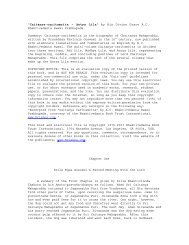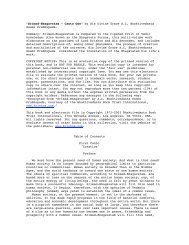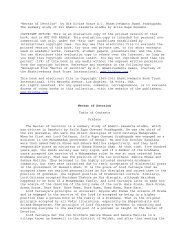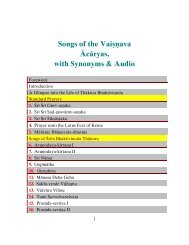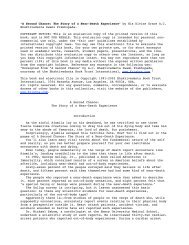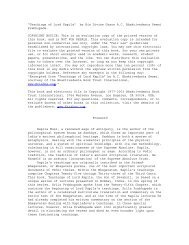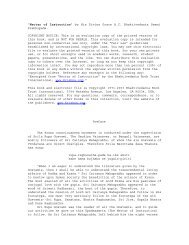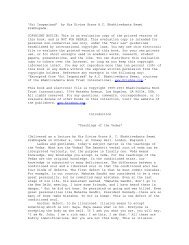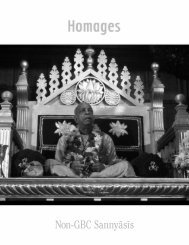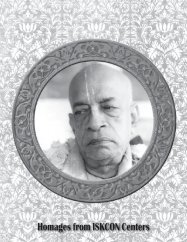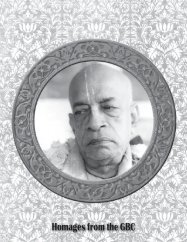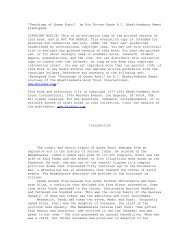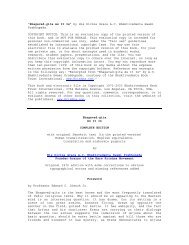“Mukunda-Mala-Stotra,” translation and commentary ... - Krishna.com
“Mukunda-Mala-Stotra,” translation and commentary ... - Krishna.com
“Mukunda-Mala-Stotra,” translation and commentary ... - Krishna.com
Create successful ePaper yourself
Turn your PDF publications into a flip-book with our unique Google optimized e-Paper software.
tribulations experienced in the Kumbhipaka hell. He is not concerned with any of<br />
them because he is always engaged in the transcendental loving service of the<br />
Lord. By the grace of the Lord, even in the Kumbhipaka hell a pure devotee can<br />
adjust the situation <strong>and</strong> turn it into Vaikuntha.<br />
The Bhagavad-gita <strong>and</strong> all other revealed scriptures say that the Lord<br />
ac<strong>com</strong>panies every living being in His localized aspect of Paramatma, the<br />
Supersoul. Therefore even a living being destined to reside in the Kumbhipaka<br />
hell is ac<strong>com</strong>panied by his eternal <strong>com</strong>panion, the Lord. But by His inconceivable<br />
power the Lord remains aloof from these hellish circumstances, just as the sky<br />
remains separate from the air although seemingly mixed with it.<br />
Similarly, the pure devotee of the Lord does not live anywhere in this<br />
material world, although He appears to live among mundane creatures. Actually,<br />
the devotee lives in Vaikuntha. In this way the Supreme Lord bestows upon His<br />
pure devotee the inconceivable power that allows him to stay aloof from all<br />
mundane circumstances <strong>and</strong> reside eternally in the spiritual world. The devotee<br />
does not want this power consciously or unconsciously, but the Lord is careful<br />
about His devotee, just as a mother is always careful about her little child,<br />
who is <strong>com</strong>pletely dependent on her care.<br />
A pure devotee like King Kulasekhara refuses to associate with beautiful<br />
soft-skinned women. There are different grades of women on different planets in<br />
the universe. Even on the earth there are different types of women who are<br />
enjoyed by different types of men. But on higher planets there are women many,<br />
many millions of times more beautiful than the women on this planet, <strong>and</strong> there<br />
are also many pleasure abodes where they can be enjoyed. The best of all of<br />
these is the N<strong>and</strong>ana Gardens on Svargaloka. In the N<strong>and</strong>ana Gardens--a "Garden of<br />
Eden"--those who are qualified can enjoy varieties of beautiful women called<br />
Apsaras. The demigods generally enjoy the <strong>com</strong>pany of the Apsaras in the same way<br />
that the great Mogul kings <strong>and</strong> nawabs enjoyed their harems. But these kings <strong>and</strong><br />
nawabs are like straw before the demigods of Svargaloka, which lies in the third<br />
stratum of the universe.<br />
The inner tendency to enjoy is in the core of every living being's heart. But<br />
in the diseased state of material existence the living being misuses that<br />
tendency. The more he increases this diseased, conditioned state, the longer he<br />
extends his period of material existence. The sastras advise, therefore, that a<br />
living entity should accept only those sense-enjoyable objects necessary for the<br />
upkeep of the material body <strong>and</strong> reject those that are just for sense<br />
gratification. In this way he will reduce the tendency for sense enjoyment. This<br />
restraint cannot be imposed by force; it must be voluntary.<br />
Such restraint automatically develops in the course of one's executing<br />
devotional service. Thus one who is already engaged in devotional service need<br />
not restrain his senses artificially. A pure devotee like King Kulasekhara,<br />
therefore, neither desires sense enjoyment nor exerts himself to restrain his<br />
senses; rather, he tries only to engage himself in the transcendental loving<br />
service of the Lord, without any stop.<br />
SUTRA 5*<br />
TEXT<br />
nastha dharme na vasu-nicaye naiva kamopabhoge<br />
yad bhavyam tad bhavatu bhagavan purva-karmanurupam<br />
etat prarthyam mama bahu matam janma-janmantare 'pi<br />
tvat-padambhoruha-yuga-gata niscala bhaktir astu<br />
SYNONYMS<br />
na--not; astha--special regard; dharme--for religiosity; na--nor; vasu--of<br />
wealth; nicaye--for the accumulation; na eva--nor even; kama-upabhoge--for sense



